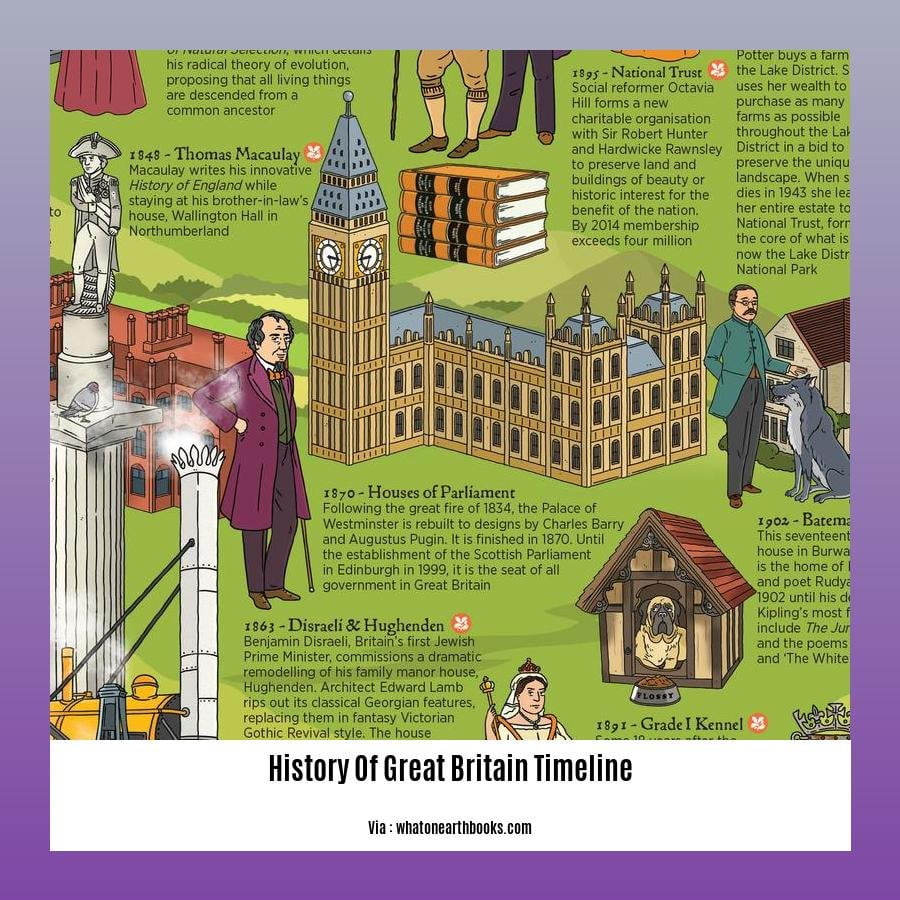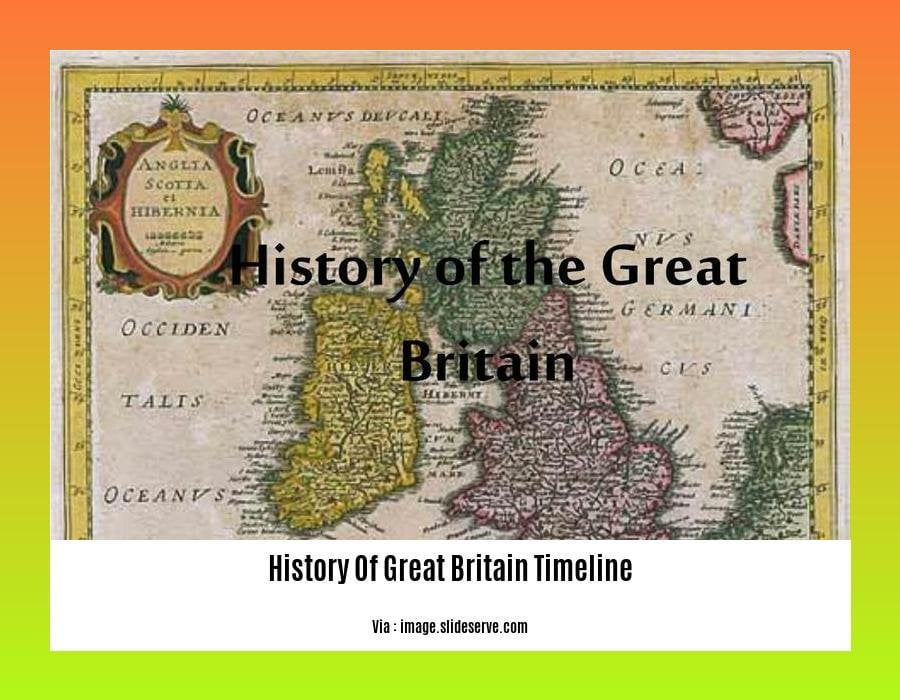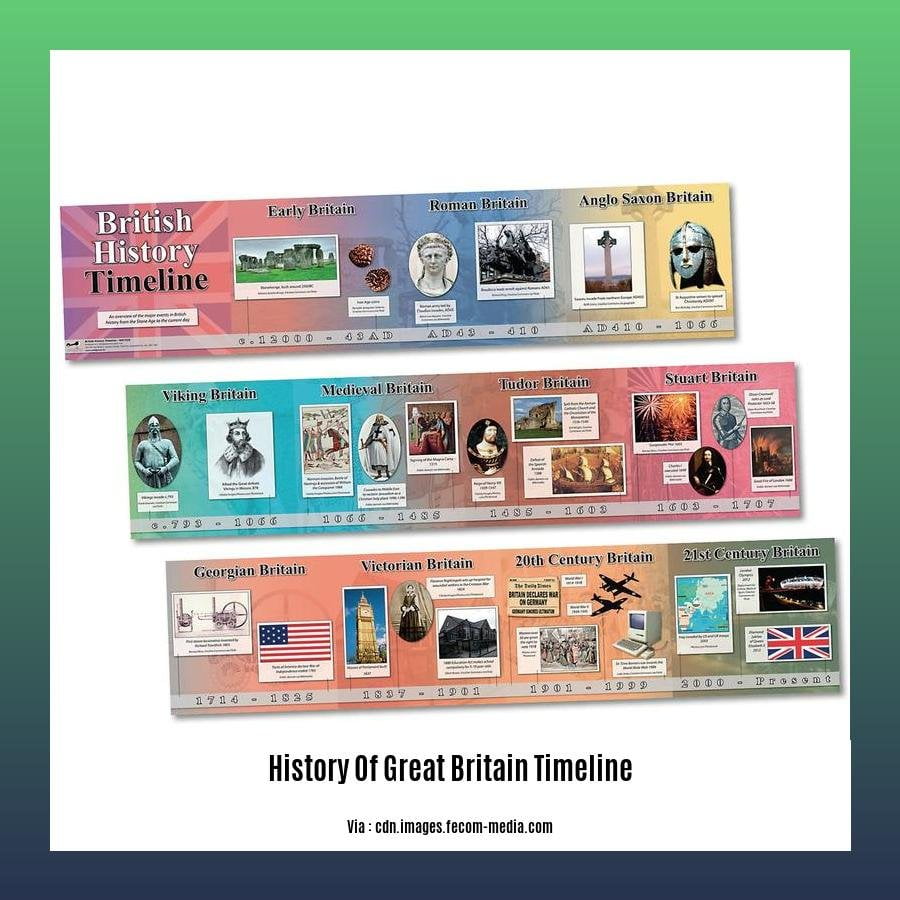Delve into the tapestry of time with [A Comprehensive History of Great Britain Timeline]. Join us on an enthralling journey through the annals of Britain, where we’ll unravel the intricate threads of its past, meet its iconic figures, and witness the transformative events that have shaped its destiny over millennia.
Key Takeaways:
- 1939: Britain declared war on Germany after its invasion of Poland, marking the beginning of World War II.
- 1945: The British coal industry was nationalized, bringing it under government control.
- 1947: India gained independence from Britain, marking a significant shift in the Empire’s boundaries.
- 1948: Post-war immigration from Commonwealth countries began, shaping Britain’s multicultural society.
- 1948: The National Health Service (NHS) was established, providing healthcare to all UK residents.
- 1948: Berlin Airlift supplied essential goods to West Berlin during the Soviet blockade.
- 1948: The Olympic Games were held in London, showcasing international sporting prowess.
- 1979: Margaret Thatcher became Britain’s first female prime minister, ushering in a period of economic and political change.
- 1997: Labour Party led by Tony Blair won a landslide election victory, signaling a shift in the nation’s political landscape.
History Of Great Britain Timeline

We’ll delve into the chronicles of Great Britain, tracing its evolution across centuries of monarchs, wars, social shifts, and cultural triumphs.
Ancient Era
- 43 AD: Roman invasion marks the beginning of Roman Britain.
- 410 AD: Romans withdraw, leaving Britain vulnerable to Anglo-Saxon invasions.
Medieval Period
- 1066: Norman conquest by William the Conqueror.
- 1215: Signing of Magna Carta, establishing the principle of limited monarchy.
- 1348-1350: Black Death devastates Britain.
Tudor Era
- 1485: Henry VII becomes the first Tudor monarch.
- 1534: Act of Supremacy establishes the Church of England.
- 1588: Defeat of the Spanish Armada.
Stuart Era
- 1603: Union of the Crowns unites England and Scotland.
- 1642-1651: Civil War between Royalists and Parliamentarians.
- 1688: Glorious Revolution deposes James II.
18th and 19th Centuries
- 1707: Act of Union merges England, Scotland, and Wales into Great Britain.
- 1801: Union with Ireland creates the United Kingdom.
- 1837: Queen Victoria ascends to the throne, ushering in the Victorian era.
- 1857: Indian Rebellion against British rule.
- 1867: Second Reform Act expands the franchise.
20th Century
- 1914-1918: World War I.
- 1939-1945: World War II.
- 1947: India gains independence from Britain.
- 1948: Establishment of the National Health Service.
- 1979: Margaret Thatcher elected as Prime Minister.
- 1997: Tony Blair leads Labour to landslide election victory.
21st Century
- 2003: Iraq War begins.
- 2016: Brexit referendum results in UK’s decision to leave the European Union.
- 2022: Queen Elizabeth II passes away, and Charles III becomes King.
Embark on this chronological journey, exploring the events, people, and ideas that have shaped the History Of Great Britain Timeline.
Immerse yourself in the history of Great Britain, a nation steeped in centuries of captivating events.
Dive into the monarchy’s intriguing legacy, shaping the nation’s identity and culture.
Discover the complex relationship between Great Britain and Ireland through the annals of time.
Gain insights into Great Britain’s pivotal past through podcast episodes that bring history to life.
Explore the multifaceted connections between Great Britain and India, spanning centuries of trade, diplomacy, and cultural exchange.
Unravel the somber truths of Great Britain’s involvement in the transatlantic slave trade, a chapter that has left an enduring mark on the nation’s conscience.
Norman Conquest and the Middle Ages

A pivotal era in British history, the Norman Conquest and the Middle Ages, witnessed a dramatic transformation of society and culture. Here’s a concise overview:
The Conquest: A Turning Point
In 1066, William, Duke of Normandy, invaded England. His victory at the Battle of Hastings marked the beginning of a new era. The Norman conquerors brought their language, legal system, and feudal customs to the country, profoundly impacting British society.
The Middle Ages
The Middle Ages (1066-1485) were a time of both great change and stability. Towns and trade flourished, and the Church played a central role in daily life. Architectural masterpieces like Westminster Abbey were built, and the English language began to take shape.
Key Takeaways:
- The Norman Conquest brought profound changes in language, law, and society.
- The Middle Ages saw the rise of towns, trade, and the influence of the Church.
- Architectural masterpieces and the development of the English language characterized this period.
Sources:
- Norman Conquest | Definition, Summary, & Facts | Britannica
- The Middle Ages | British History Online
Tudor and Stuart Dynasties
The Tudor and Stuart Dynasties ruled England for over a century, from 1485 to 1714. This period saw significant political, religious, and cultural changes, including the English Reformation and the rise of the British Empire.
Key Takeaways:
- The Tudor Dynasty began with Henry VII and ended with Elizabeth I. The iconic figure of this era, Henry VIII, broke with the Catholic Church and established the Church of England.
- The Stuart Dynasty followed the Tudors and included notable monarchs such as James I and Charles I. The Stuart period witnessed religious tensions and political turmoil, culminating in the English Civil War.
- The reigns of the Tudor and Stuart monarchs were marked by exploration, colonization, and the expansion of the British Empire.
- The legacy of these dynasties continues to influence British history and culture to this day.
Sources:
18th and 19th Century: Industrialization and Empire
Key Takeaways:
- The Industrial Revolution transformed Britain into an industrial powerhouse.
- Britain’s imperial expansion shaped its global influence and power.
- Technological advancements fueled industrialization and social changes.
- Urbanization and labor issues emerged as a result of industrialization.
- Britain’s empire provided raw materials and markets for its industries.
The 18th and 19th centuries marked a pivotal period in British history, characterized by the rapid industrialization and expansion of the British Empire. These transformative developments left an indelible mark on the nation’s economy, society, and global influence.
Industrial Revolution
The Industrial Revolution began in Britain during the mid-18th century and spread to other parts of the world. It involved fundamental changes in manufacturing, agriculture, and transportation, leading to increased mechanization, production efficiency, and overall economic growth. Technological advancements, such as the steam engine, spinning jenny, and power loom, played a crucial role in driving the Industrial Revolution.
British Empire
Alongside industrialization, Britain’s empire expanded rapidly in the 19th century, reaching its zenith in the late Victorian era. The acquisition of colonies provided access to raw materials, markets for British goods, and strategic advantages in global trade. The empire’s expansion brought both economic benefits and challenges, including increased military spending, conflicts with rival powers, and debates over colonial policies.
Social and Economic Impacts
The Industrial Revolution and British imperial expansion had profound social and economic impacts. Urbanization surged as people migrated from rural areas to work in factories and cities. This led to overcrowding, poor living conditions, and the emergence of labor issues. Unions and labor movements formed to advocate for better wages, working conditions, and workers’ rights.
Relevant URL Sources:












